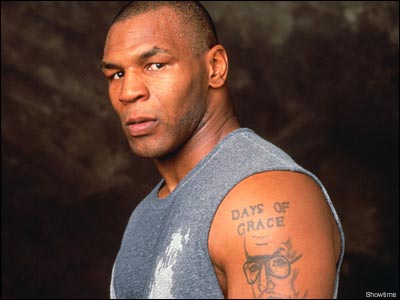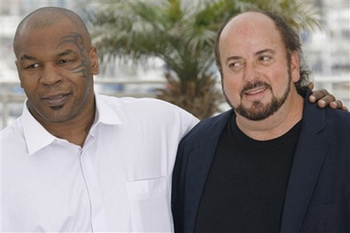Movie Review: “Tyson” — Interpretation, Explanation or Sheer Exploitation?

James Toback’s new documentary about boxer Mike Tyson explores a demonic urgency that fattens on the destruction of others.
By Harvey Blume
At the end of “Tyson,” James Toback’s documentary about him, the ex-heavyweight champ, now 43 years old, breathes heavily and falls silent. He seems talked out, and is certainly, by his own admission, punched out. After his last bout, in 2005, a dull exhibition in which he was defeated by journeyman fighter Ken Mcbride, Tyson caressingly wished his foe a good career, and declared that he would no longer sully a sport he loved by participating in it with nothing in mind but the purse.
It was a graceful departure from boxing by a man whose entry into it was marked by unique fury. There was never a younger heavyweight champ than Tyson, and maybe never — as clips in the film abundantly argue — a more dangerous man to encounter in the ring than Tyson was in his late teens and early twenties. The veteran trainer Cus D’amato took in the raw kid, both predator and prey in his Brooklyn neighborhood, broke him down, according to Tyson, and put him back together. D’amato mentored him, taught him, filled the once insecure fatso, helpless when bullies stole his glasses, with terrific confidence. Tyson, after catching onto D’amato’s con game, went along with it completely.
Tyson says that for the wizened D’amato boxing was at its core a spiritual discipline, and if you had that right the physical element would be guaranteed. Tyson had spirit, for sure, in the form of a demonic urgency that fattened, he is happy to explain, on the destruction of his opponents. Chess champ Bobby Fischer, another Brooklyn boy, once told Dick Cavett, who had asked what the great thrill of chess was: “I like the moment when I break a man’s ego.”
Different sports, similar spirits.
One difference between the Brooklyn boys is that after knocking all his opponents into chess kingdom come, Fisher hid out. Tyson, on the other hand, went to jail, witnessing things there that reduced a man not exactly unaccustomed to violence or abuse to speechless misery. “Tyson” is, whatever else it is, and however briefly, a movie about a monstrous prison system.
Fischer fled from, among other things, exactly the sort of interrogation Tyson seems to welcome, or at least, allow, in “Tyson”. Tyson talks, often eloquently — not well-read, not necessarily well-pronounced talk, but searching, talk-drunk talk nevertheless. One of his subjects, in fact, is how much he loves to talk, how much he loves a female companion to be verbal with him — when he’s not seriously ravishing her, that is.
Tyson curses eloquently, too, reserving his most gloriously heartfelt damnations for Desiree Washington, the woman whose accusation of rape resulted in a guilty verdict — “one of the worst miscarriages of justice I’ve ever experienced,” according to Alan Dershowitz, who was part of the defense team — and Tyson’s three years in jail, some of it in frightening solitary.
Bobby Fischer, by way of contrast, didn’t enjoy talk. As he memorably put it: “I don’t believe in psychology. I believe in good moves.” But Tyson has been forced to contend with a life beyond good punches. After this film, you can’t but wish him well. He’s exposed himself so thoroughly. The camera, though fixated on his face, has shown him in the round.

Mike Tyson and director James Toback
But there’s a problem: Who is it who has shown Mike Tyson in the round? Who has been doing the interrogating? The answer, obviously, is that it’s James Toback, whose career as film-maker hinges on and does not rise beyond the quasi-pornographic portrayal of the black male as incarnation of sexuality, savagery, and force.
You never see Toback in this movie, you never hear him; he is invisible, as if he has recused himself. But when Tyson responds to questions from out of the blue they are from Toback. Toback is there priming him and in the end editing him. Toback concludes the film on Tyson’s heavy breathing.
What is Tyson to Toback? His missing link? His noble savage? When Toback shows Tyson as naked as he lets himself be is in this film, do we get interpretation, explanation or sheer exploitation?
Bobby Fischer lasted until the age of 64.
Mike Tyson, as noted above, is but 43.
————————————————————————————————————–
Harvey Blume’s blog on chess can be found here.


As always, very interesting Harvey. You leave me wanting more, not necessarily more Tyson but more of your critique. I’ll check out the movie and be back.
I think the critique is unfair to this movie. The movie is very engaging, and it allows a deep insight into Tyson’s psychology. Extraordinary insight, which is a great achievement from both Tyson and the director. I felt Tyson was authentic, and the portrait is balanced. Please tell me any other interviewee who shares more of himself. The crime, the drugs, his foolishness. How he was taking advantage of or was fooling around with women. His insecurity and lack of groundedness. His thought processes. And the sparks of inspiration, and the flame of aspiration. How the rays of trust came into the darkness of his World. How his mentor touched and “saved” his life. I found the story very human, touching and inspiring. I highly recommend this movie to everyone who likes to think about life, achievement, and meaning.